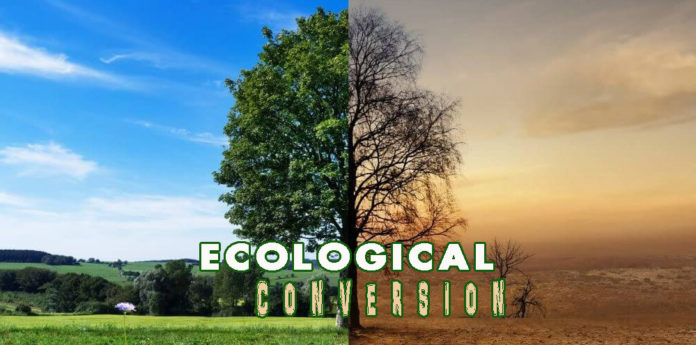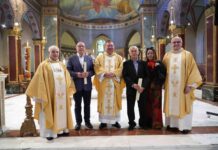The year 2020 marks the 50th anniversary of Earth Day, “Jubilee for the Earth” is this year’s theme for Season of Creation. Pope Francis said in his 2020 message that the period from September 1st to October 4th – the feast day of St. Francis of Assisi – is being celebrated as a “Season of Creation.”
In the Bible, a Jubilee is a sacred time to remember, return, rest, restore, and rejoice, as Pope Francis wrote in his message: “A Jubilee is indeed a time of grace to remember creation’s original vocation to exist and flourish as a community of love. We exist only in relationships: with God the Creator, with our brothers and sisters as members of a common family, and with all of God’s creatures within our common home.” He added, “A Jubilee is a time to return to God our loving Creator. We cannot live in harmony with creation if we are not at peace with the Creator who is the source and origin of all things. As Pope Benedict observed, ‘the brutal consumption of creation begins where God is missing, where matter has become simply material for us, where we ourselves are the ultimate measure, where everything is simply our property.’”
As part of the “Season of Creation,” online webinar discussions will be held throughout September focused on sustainable development in different regions of the world. Live translation will be provided. Pope Francis pointed to specific steps that countries can take to care for creation. These included biodiversity restoration, protection of indigenous communities, and reducing emissions.
Climate restoration is of utmost importance, since we are in the midst of a climate emergency. We are running out of time, as our children and young people have reminded us. We need to do everything in our capacity to limit global average temperature rise under the threshold of 1.5°C enshrined in the Paris Climate Agreement, for going beyond that will prove catastrophic, especially for poor communities around the world. For which Pope Francis has called for the world leaders, “to stand up for intra-generational and inter-generational solidarity at this critical moment. I invite all nations to adopt more ambitious national targets to reduce emissions, in preparation for the important Climate Summit (COP 26) in Glasgow in the United Kingdom. To support the United Nations’ call to safeguard 30% of the earth as protected habitats by 2030 to counter biodiversity loss, stating that the Summit on Biodiversity (COP 15) in Kunming, China could become “a turning point in restoring the earth to be a home of life in abundance, as willed by the Creator.”
This year also marks the 5th Anniversary of the encyclical of Pope Francis, “Laudato Si”. The World Day of Prayer for the Care of Creation was established following the publication of the encyclical in 2015. The pope hailed initiatives of the Laudato si’ anniversary year, which began on May 24, 2020. He said that this year should lead to “long-term action plans to practice integral ecology in our families, parishes and dioceses, religious orders, our schools and universities.”
COVID-19 pandemic has brought us to a crossroad and hence the Holy Father has called for an “ecological conversion” by the cancellation of the debt of the most vulnerable countries, in recognition of the severe impacts of the medical, social and economic crises they face as a result of the deadly pandemic. We are running out of time with regard to the current climate crisis, unless we take action it “will prove catastrophic, especially for poor communities around the world”.
Pope Francis also wrote of “restorative justice” in restoring the right of indigenous communities to regain control of the usage of the land on which they have lived for generations. “Indigenous communities,” he said, “must be protected from companies, particularly multinational companies, that ‘operate in less developed countries in ways they could never do at home’, through the destructive extraction of fossil fuels, minerals, timber and agro-industrial products.”
The pandemic has also presented for us a “decisive moment” to examine our habits of energy usage, consumption, transportation, and diet, to eliminate the superfluous and destruction aspects of our economies in favour of “life-giving ways” to trade, produce, and transport goods. In some ways, the current pandemic has led us to rediscover simpler and sustainable lifestyles. The crisis, in a sense, has given us a chance to develop new ways of living. Already we can see how the earth can recover if we allow it to rest: the air becomes cleaner, the waters clearer, and animals have returned to many places from where they had previously disappeared.
Let us find just and sustainable ways of living that can give the Earth the rest it requires, ways that satisfy everyone with a sufficiency, without destroying the ecosystems that sustain us. Let us all rejoice that our loving Creator sustains our humble efforts to care for the earth, which is also God’s home where his Word ‘became flesh and lived among us’ and which is constantly being renewed by the outpouring of the Holy Spirit, and pray, “Send forth your Spirit, O Lord, and renew the face of the earth.”
Fr. Joseph Royan, C.Ss.R.
Province of Bangalore







